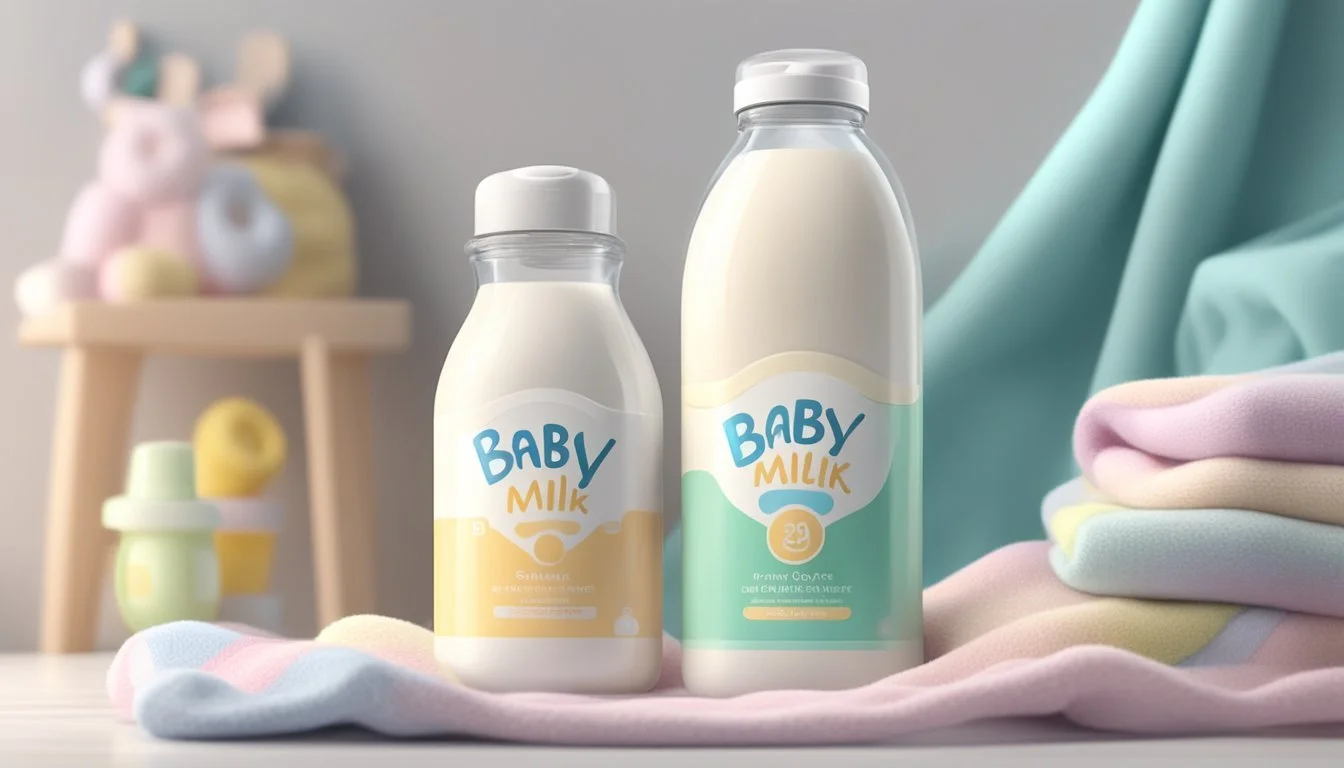Is Baby Formula a Healthy and Safe Option for Carnivore Diet Families?
Exploring Nutritional Compatibility and Safety
Families following the carnivore diet often face challenges when it comes to infant nutrition. In a landscape where the emphasis is on animal-based foods, the question arises: is baby formula a healthy and safe option for carnivore diet families? As parents seek the best nutrition for their children, it's crucial to consider the specific needs of infants alongside the principles of the carnivore diet.
Baby formula typically contains a mix of proteins, fats, vitamins, and minerals. While it isn't animal-based, it aims to mimic the nutritional composition of breast milk, providing essential nutrients for infant growth and development. This includes vital macronutrients like protein and fat, as well as vitamin D and other necessary vitamins and minerals.
For carnivore diet families, baby formula can be a suitable alternative to ensure infants receive balanced nutrition during their early months. Although not strictly aligned with the carnivore philosophy, baby formula is designed to support infant health, making it a practical choice for parents adhering to this diet without compromising their child's nutritional needs.
Understanding Baby Formula
Choosing the right baby formula is crucial for ensuring that infants receive the essential nutrients they need. This section will discuss the types of infant formulas available and compare their ingredients to help parents make an informed decision.
Types of Infant Formulas
Infant formulas are classified to cater to various nutritional needs and medical conditions.
Term Formulas
These are suitable for most full-term infants. They include brands like Enfamil with Iron and Similac with Iron.
Preterm Formulas
Designed specifically for premature babies, these formulas contain higher calories and necessary nutrients to support growth.
Enriched Formulas
These provide additional nutrients for babies with specific health requirements or dietary needs.
Specialty Formulas
Formulas such as hypoallergenic and soy-based options are available for infants who have allergies or lactose intolerance. Hydrolyzed protein formulas are designed for easier digestion, while A2 milk formulas might be recommended for babies with a sensitivity to A1 protein.
Comparing Formula Ingredients
Ingredients in baby formulas are carefully selected to mimic the nutrition found in breast milk.
Proteins
Common sources include whey protein, nonfat milk, and soy protein isolate. Whey is easier to digest than casein and is often preferred.
Carbohydrates
These may come from lactose, sucrose, glucose, or corn syrup. Lactose is the most common, mimicking the natural sugar in breast milk.
Fats
Oils such as palm oil, soy oil, and others are used to provide essential fatty acids. Formulas may also include DHA and ARA, acids important for brain and eye development.
Vitamins and Minerals
Essential vitamins like vitamin A, ascorbic acid, and minerals such as calcium carbonate, ferrous sulfate, zinc sulfate are incorporated. They ensure infants develop healthily.
Additional Ingredients
Probiotics and prebiotics are sometimes added to support gut health. Enzymes and other bioactive compounds are also included to support various physiological functions.
Nutritional Considerations for Infants
Choosing the right baby formula is crucial for ensuring your infant receives balanced nutrition. This involves understanding the content of proteins, fats, vitamins, minerals, and potential allergens or intolerances.
Protein and Fat Content
Protein and fat are essential for infant growth and development. Infant formulas typically contain proteins sourced from cow’s milk or soy. Proteins from cow’s milk are processed to make them more digestible. For infants with milk allergies, hydrolyzed or soy protein formulas are available.
Fats in infant formula mimic those found in breast milk, providing crucial calories and essential fatty acids like ARA and DHA, important for brain and eye development. Choosing a formula with the right balance of proteins and fats can significantly impact your infant's comfort and growth.
Vitamins and Minerals
Vitamins and minerals are vital for your baby’s development. Infant formulas are fortified with essential nutrients to ensure they meet dietary needs. Key vitamins include Vitamins A, D, and E, supporting vision, bone health, and immune function, respectively.
Minerals like iron, which prevents anemia, and calcium, important for bone growth, are included in formulas. Labeling requirements ensure that formulas are enriched sufficiently to meet the daily nutritional requirements of an infant, providing a reliable alternative to breast milk.
Allergies and Intolerances
Allergies and intolerances must be considered when selecting a formula. Some infants may have milk allergies or lactose intolerance, necessitating alternative formulas. Hypoallergenic formulas are designed to reduce allergic reactions and are often recommended for children with severe allergies.
For lactose intolerance, lactose-free formulas use alternative carbohydrates. Soy-based formulas provide another option for those avoiding cow's milk proteins. Understanding these options helps parents choose a formula that minimizes the risk of allergic reactions and supports healthy digestion.
Safety and Regulations
Ensuring the safety of infant formula is crucial for the health of babies, especially in families adhering to specific diets. Key regulations and recent safety issues play a major role in maintaining formula quality.
FDA Guidelines and Approvals
The FDA regulates infant formula under the Federal Food, Drug, and Cosmetic Act. They require manufacturers to meet minimum nutritional standards and undergo thorough testing before approvals.
Formulas must be tested for bacteria and other contaminants to ensure safety. Stringent nutrient requirements ensure babies receive essential nutrients for growth. Hypoallergenic formulas also need specific approvals to cater to infants with allergies.
The FDA mandates proper labeling standards to help parents make informed choices about what they feed their infants. Regulations extend to production facilities, which must adhere to good manufacturing practices to minimize contamination risks.
Recent Recalls and Safety Concerns
In response to several safety concerns, the FDA has recently issued warning letters and recalls. For instance, companies like ByHeart, Mead Johnson Nutrition, and Perrigo have faced recalls due to potential contamination issues.
Recent recalls were triggered by the detection of harmful contaminants like lead, forcing companies to address hygiene and production flaws. Recalls have led to a formula shortage, impacting many families.
To combat these issues, the FDA continues to execute rigorous oversight, ensuring all infant formulas meet strict safety and manufacturing standards, protecting infants from serious health problems caused by contaminated products.
Dietary Considerations for Carnivore Diet Families
When considering the carnivore diet for infants and families, there are crucial factors regarding nutritional adequacy, particularly for the youngest members of the family.
Carnivore Diet and Infant Nutrition
Breastfeeding is encouraged for families following a carnivore diet, as breast milk naturally provides essential nutrients tailored for infants' growth and development. For those unable to breastfeed, traditional baby formulas are typically plant-based or dairy-based, which complicates adherence to an all-animal product regimen.
A carnivore diet emphasizes consuming foods like meat, fish, and eggs, but it’s vital to ensure infants receive balanced nutrition. Pediatricians agree that specific nutrients like iron, zinc, and vitamin D are critical and may require supplementation if relying solely on animal products.
Consulting with a pediatrician ensures infants' dietary needs are met without jeopardizing growth and development. Parents must be cautious and should not rely solely on an all-carnivore approach without significant medical guidance.
Alternatives to Traditional Baby Formulas
Parents adhering strictly to the carnivore diet might seek alternatives to traditional infant formulas. While most conventional formulas, such as soy-based or dairy-based options, contain plant derivatives, there are specialized formulas and options that align more closely with a carnivore diet.
Certain high-protein animal-based formulas can serve as essential supplements. In some cases, incorporating nutrients from sources like egg yolks, meats, and fish into pureed or mashed foods may be advisable as the child grows older.
Water is critical too, ensuring infants remain hydrated while consuming more protein-heavy diets. Again, a pediatrician's advice is indispensable to personalize an infant's nutrition plan to ensure it is safe and effective.
Choosing the Right Baby Formula
When selecting an appropriate baby formula, it's important to consider both the brand and the quality of the ingredients. This ensures that the infant receives ample nutrition and meets dietary needs.
Brand Comparisons
Enfamil, Similac, and Gerber are popular brands of baby formula. Each offers various formulations designed to address specific needs such as sensitive digestion, added probiotics, or higher iron content.
Enfamil is known for its NeuroPro line, which includes DHA for brain development. Similac boasts the Pro-Advance line that includes 2'-FL HMO, an immune-boosting ingredient. Gerber offers Good Start formulas, which include comfort proteins for easier digestion.
When comparing these brands, one should evaluate specific needs such as tolerance, cost, and ingredient sourcing. Each brand is widely available and meets stringent FDA requirements, ensuring safe and nutritious options for infants.
Identifying Quality Ingredients
Protein, carbohydrates, and fats constitute the majority of baby formula, making the choice of these ingredients critical. High-quality proteins such as those found in Enfamil NeuroPro or Similac Pro-Advance can contribute to easier digestion and better overall comfort for the baby.
Look for formulas fortified with iron, typically at least 8mg/L, which supports healthy growth. DHA and ARA are beneficial for brain and eye development. Avoid formulas with added sugars or unnecessary fillers.
Each canister should be in excellent condition with no rust, puffy ends, or leaks. Confirm that the formula is not expired and is specifically intended for infants rather than toddlers. Consulting a pediatrician can provide additional guidance tailored to a child's individual needs.
Preparation and Feeding Tips
Proper preparation and feeding are crucial for the healthy growth and development of infants on a carnivore diet or any diet. Ensuring correct mixing, storing, and transitioning to solid foods helps maintain safety and nutritional adequacy.
Mixing and Storing Formulas
Using safe methods to prepare and store infant formula is essential. Powders should be mixed with boiled water that has been cooled to around 70°C. This helps to eliminate any harmful bacteria.
Formula Storage Guidelines:
Refrigerate prepared formula if not used immediately. Discard any stored formula after 24 hours.
Avoid Room Temperature Storage beyond two hours to reduce bacterial growth risks.
Dispose of unused formula if it has been in contact with the baby's mouth for more than an hour.
Heating formula should be done using a bottle warmer or a bowl of hot water. Microwaving is not recommended due to uneven heating. Always test the temperature before feeding.
Transitioning to Solids and Other Foods
Introducing solid foods is an important milestone in an infant's development. Begin with small amounts of pureed meats, gradually increasing texture and variety. Observing the baby’s readiness and interest in foods aids in smoother transitions.
Transition Tips:
Start Around 6 Months: Monitor for readiness signs like being able to sit with support.
Meat Purees: Offer finely pureed meat as first solids, ensuring soft and easy-to-swallow consistency.
Gradual Introduction: Integrate new foods slowly, allowing a few days between each to monitor for allergies or intolerances.
Consistency: Maintain a consistent routine, providing a balanced diet alongside formula feeding.
Keeping the transition gradual and consistent helps promote acceptance and proper nutrition, supporting the baby’s growth and development effectively.
Expert Opinions and Parental Experiences
Exploring expert and parental perspectives on the safety and health benefits of baby formula for families adhering to a carnivore diet reveals valuable insights. Pediatricians provide guidance on nutritional needs, while parents share their practical experiences and concerns.
Pediatrician Recommendations
Pediatricians often emphasize the importance of meeting the nutritional needs of infants. They recommend that parents consult with healthcare professionals before choosing a formula. This is particularly crucial for those on specialized diets like the carnivore diet.
The American Academy of Pediatrics supports formula as a safe and nutritious feeding option, alongside breastfeeding. Pediatricians advise selecting formulas that ensure appropriate growth and development, addressing potential risks of deficiencies.
Parental Reviews and Concerns
Parents express diverse viewpoints regarding baby formulas. Some parents on a carnivore diet praise certain formulas for their alignment with their dietary principles. They appreciate the convenience and assurance that their babies receive essential nutrients.
Conversely, other parents highlight concerns, such as potential allergies or intolerances. They often rely on peer recommendations and online reviews. The current formula shortage has intensified these worries, prompting families to explore alternatives or seek professional advice.
These insights from experts and parents provide a comprehensive understanding of the considerations when choosing baby formula in carnivore diet families.
Future of Infant Nutrition
The future of infant nutrition aims to mirror natural breast milk more closely while incorporating sustainable and ethical practices. Innovations in formula production and a focus on sustainability will play a pivotal role.
Innovations in Formula Production
Innovations in baby formula production are pushing the boundaries of nutrition science. The goal is to create formulas that more closely resemble the nutritional profile of breast milk. Incorporating functional ingredients like prebiotics, probiotics, and specific proteins can enhance the health benefits of infant formulas.
New technologies enable more precise balancing of essential nutrients. This ensures infants get the right mix of vitamins, minerals, and other critical elements for their development. Research is ongoing to include components such as human milk oligosaccharides (HMOs), which support a healthy gut microbiome.
These advancements aim to improve formula quality without compromising on safety. Manufacturers are investing in clinical trials to validate the effectiveness of these newer formulations.
Sustainable and Ethical Considerations
Sustainability in infant nutrition focuses on reducing the environmental impact of formula production. Companies are adopting greener processes and opting for sustainable sourcing of ingredients. This includes using renewable resources and minimizing waste in packaging and manufacturing.
Ethical considerations are equally important. There is a shift toward ensuring fair labor practices and ethical treatment of animals in the production chain. Transparency in sourcing and manufacturing processes helps build trust with consumers.
Efforts are being made to reduce the carbon footprint of infant formula products. Innovations in this area include biodegradable packaging, which helps lower the environmental impact. Ethical and sustainable practices aim to meet the growing demand for responsibly produced infant nutrition.
Conclusion
Evaluating baby formula for families on a carnivore diet requires considering various health aspects.
Baby formula must support growth and development. It should provide essential nutrients like calcium, Vitamin D, protein, and fat-soluble vitamins.
Infant formula offers a balanced mix of nutrients needed for growing infants, despite not aligning strictly with carnivore diet principles. It ensures babies get all necessary components for healthy development.
A carnivore diet focuses on animal products exclusively. However, baby formula often includes additional nutrients sourced from other food groups, ensuring a more comprehensive nutritional profile.
Parents should consult with healthcare professionals to determine the best approach for their child's diet. Customizing the diet to include both baby formula and carnivore diet components can be beneficial.
While following a carnivore diet, understanding the importance of specific nutrients in baby formula helps in making informed decisions. Folic acid, iron, and omega-3 fatty acids are crucial for infant brain development and physical growth.
Incorporating baby formula in a carnivore diet can help meet an infant's nutritional needs effectively. This combination ensures that dietary practices support the overall health and development goals for the child.









